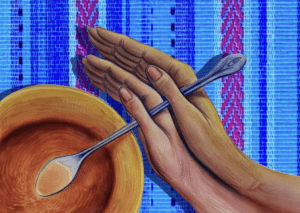FOLEY: Tio Time: Latin Family Orientedness vs. American Individualism
Every Mexican has a tio who they aren’t quite sure is their tio — biologically, at least.

This piece was published as part of the News’ 2022 Lifting Up Latinx Identity special issue, celebrating Latinx Heritage Month from Sep. 15 to Oct. 15.
Mexican has a tio who they aren’t quite sure is their tio — biologically, at least. That is to say, if an adult around your parents’ age is around enough, they’re granted the tio title. I’ll be guilty of this, too. My friend Andrea jokes that to immerse my future children in Spanish, I can send them over to her for a month and lie that Tia Andrea doesn’t speak any English so it’ll be puro Español with her.
Mexican families are typically more extensive, and so is their role in daily life. Generally, family connectivity is celebrated more prominently in Latino cultures than American culture. Of course, no particular culture loves their families more than others — love is just shown differently. Many Latinos fundamentally believe that individual action reflects one’s family values, so loyalty, tradition and honor are prioritized accordingly. Greater group orientation characterizes the family as a larger safety net against hardship.
It’s an imperfect system. Strict adherence to the family unit may entail that instances of abuse and dysfunction are swept under the rug. At my local community college’s sociology symposium, one presenting student explained that Latinas are less likely to transfer to a four-year college after community college partly due to cultural pressure to stay home. Increased family dependence may also enforce unbalanced power dynamics, enabling parents to dictate children’s career paths or enforce religious and gendered ideas into the minutia of their children’s lives. But familial culture doesn’t necessitate hypercontrol: there’s plenty of room for diverging perspectives. A personal standout is my mom’s conversation with a friend who’d pushed her daughter to turn down a master’s degree program scholarship abroad to stay closer to family.
“It’s Mexican culture,” she said, but my mom disagreed. She told me she almost saw her children as an extension of herself, so their successes and travels felt like hers, too.
Therein lies the distinction between family-oriented and helicopter parenting. Hovering over growing children carries a perception of weakness, so many American parents pridefully send their children “out of the nest” as soon as they can. To be a “helicopter parent” implies that you believe your child can’t handle the real world on their own. A more balanced perspective is that your child can absolutely tackle adulthood, but you’ll remain an important part of it.
Americans often romanticize the ’50s nuclear family model as the suburbanite ideal, but there’s merit to an expanded family. One or two caretakers per family unit allow for fewer shock absorbers; with a smaller group of people to rely on, familial strife may affect us more acutely and leave us lonelier. One dysfunctional parent can more easily fracture a smaller family, but having grandparents, uncles, aunts and cousins to turn to helps dilute the problem. “It takes a village” isn’t just a saying: it’s evolutionary biology. Take the widely-explored grandmother hypothesis, which suggests that grandparents long outlive their reproductive years partially because their presence in their grandchildren’s lives increases the parents’ reproductive fitness and resource availability. We benefit from wider familial systems not only for our own upbringing, but also for that of our children.
Platonic touch is comparatively rare in cultures like the U.S. and U.K., so we may turn to family for touch instead. We should put our fingers on the dissonance that many patients of color feel when encouraged by culturally white American therapists to simply cut off unhealed family members, or told that self-love is enough to compensate for lacking close relationships.
Of course, we should welcome various definitions of family and found family. In this way, we may stop turning to the hyper-individualistic, materialist default of American sociality for achievement, fulfillment and belonging in this world. The Latin practice of defining and redefining family combats isolation through resortion to some of the most natural systems we have. When we have a strong emotional core to return to again and again, we can live in abundance and resilience, regardless of what life has to offer.
Michelle Foley is a sophomore at Benjamin Franklin College. Contact her at michelle.foley@yale.edu .







